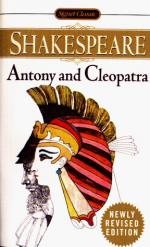|
This section contains 8,461 words (approx. 29 pages at 300 words per page) |

|
SOURCE: Vanhoutte, Jacqueline. “Antony's ‘Secret House of Death’: Suicide and Sovereignty in Antony and Cleopatra.” Philological Quarterly 79, no. 2 (spring 2000): 153-75.
In the following essay, Vanhoutte argues that Shakespeare's depiction of Antony's suicide precludes judgments of it as either ignoble or praiseworthy. Drawing on the writings of Donne and Montaigne, she explicates early modern views of self-slaughter and concludes that although Antony initially contemplates death at his own hands in a despairing frame of mind, he ultimately regards his suicide as a self-assertive act that will thwart the attempts of others to define him.
Just after Antony dies from a self-inflicted wound, Shakespeare's Cleopatra asks, “is it sin, / To rush into the secret house of death / Ere death dare come to us?”1 The question appears to be rhetorical; Cleopatra soon announces her intention to prove her “resolution” by pursuing “the briefest end” (4.15.91).2 This decision earns her the homage of...
|
This section contains 8,461 words (approx. 29 pages at 300 words per page) |

|


